Party ID & Where You Get Your News Drives Unique Factors of COVID-19 Vaccine Hesitancy
From where you grew up to where you get your news, different experiences can lead to different beliefs and opinions on important societal topics. This principle has been brought to life when it comes to how people view the coronavirus pandemic.
For example, political affiliation may lead a person to view the pandemic as a different type of crisis. Our recent research shows that Republicans view COVID-19 primarily as an economic crisis and believe re-opening should be a top priority. In contrast, Democrats view COVID-19 primarily as a health crisis and believe caution should be the guiding force, even if it is costly to the economy.
These differing perspectives can translate not just to different world views but also to different choices that have immediate impact.
One key choice that will be crucial in stopping the spread of the coronavirus is whether or not to get vaccinated, and the perceived quickness of vaccine development is becoming a liability. Just 30% of the informed public say that they are going to get vaccinated for the coronavirus as soon as a vaccine becomes available. And Republicans are more likely than Democrats to take this position.
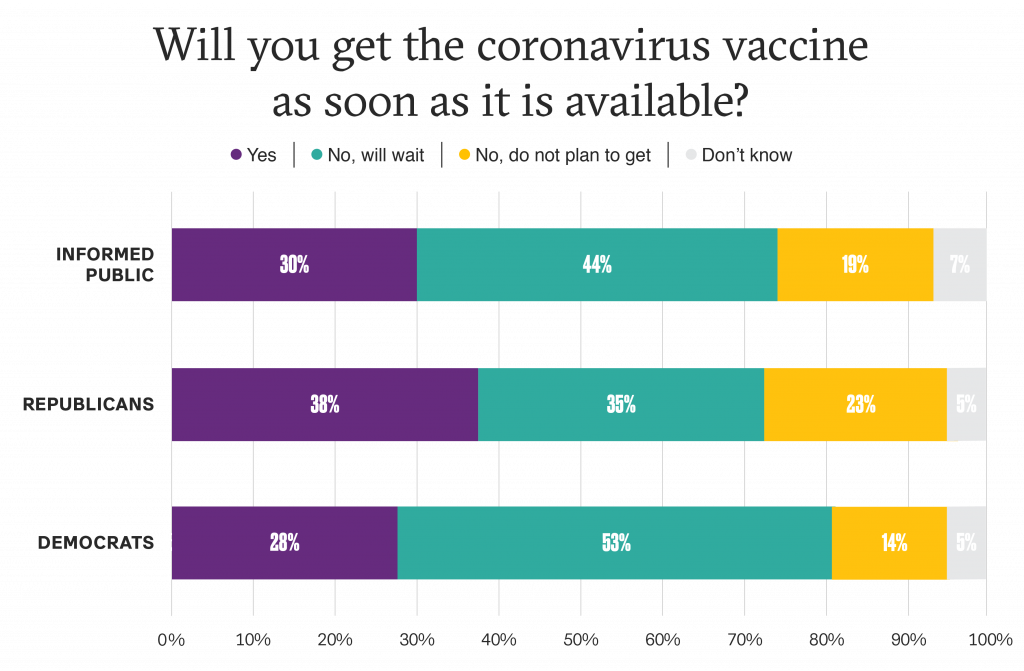
*Will you get the coronavirus vaccine as soon as it is available? SOURCE: Purple Pulse Survey of US Informed Public. N=847. September 30 – October 2.
Below we dive deeper into party identity and news consumption habits and how a person’s political party affiliation or source of news may lead to different beliefs, and then different vaccine choices based on those beliefs.
News flow on the right and left may be hurting our ability to stop the spread of the coronavirus, but for different reasons.
• On the right, there is an increased belief that coronavirus cases are going down over time, negating the need for a vaccine for some. Fox News viewers are more likely than CNN or MSNBC viewers to believe that U.S. coronavirus cases overall are decreasing week over week.
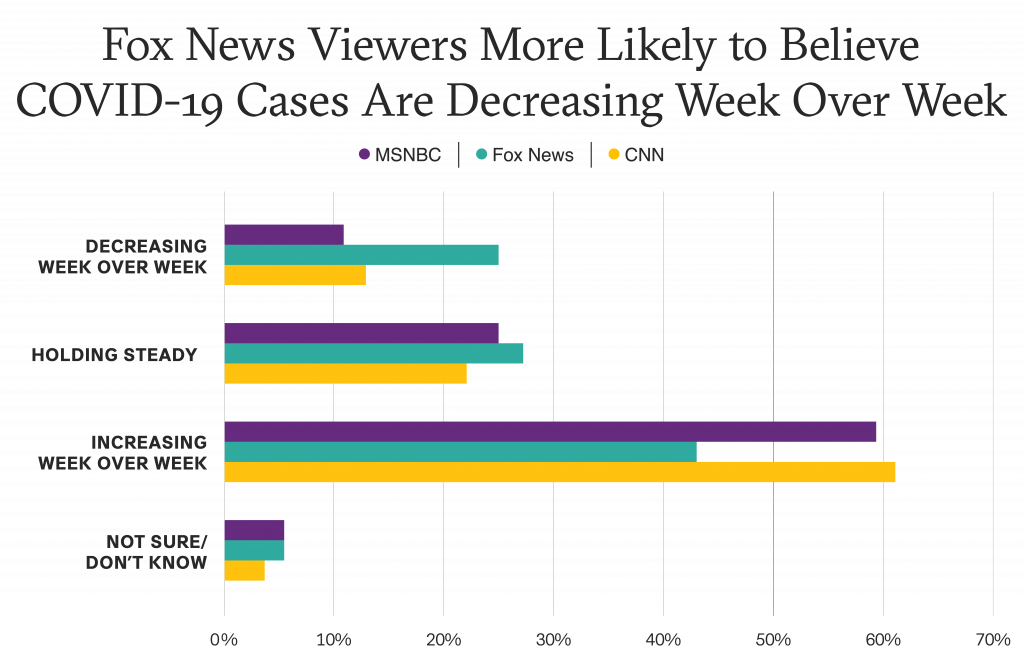
*To your knowledge, which best describes the current trend of coronavirus cases today, in your state and in the US overall? SOURCE: Purple Pulse Survey of US Informed Public. N=847. September 30 – October 2.
• On the left, coronavirus vaccine hesitancy is driven in part by concerns about the vaccine development process being rushed. Liberal cable news viewers are significantly more likely to not get vaccinated for the coronavirus if a vaccine is developed and brought to market too quickly. This view is most strongly held by MSNBC viewers, over half (57%) of which say a vaccine that was developed and brought to market too quickly would influence their decision not to get vaccinated.
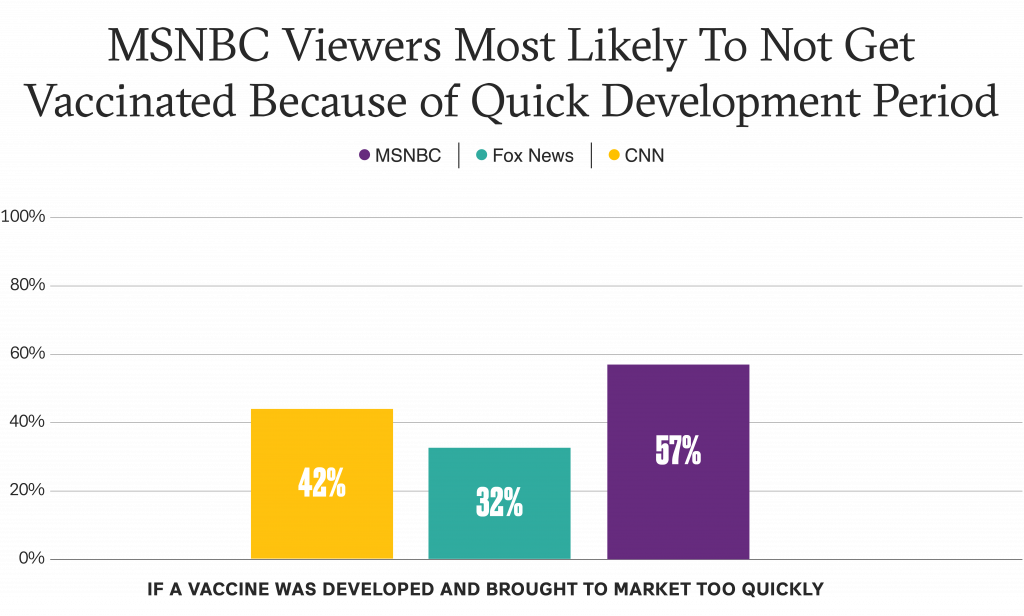
*Which of the following factors would influence your decision not to get vaccinated for the coronavirus? SOURCE: Purple Pulse Survey of US Informed Public. N=847. September 30 – October 2.
• An analysis of comments on similar Fox News and CNN Facebook posts about a coronavirus vaccine show that commenters on the CNN post express more negative opinions about a vaccine than Fox News commenters. Over 1/3 (35%) of comments on CNN’s post were critical of a vaccine compared to just 17% of comments on Fox News’ post which shared a similar sentiment. Critiques of an eventual coronavirus vaccine were multifaceted but many expressed that they did not want to get a “rushed vaccine” or be “guniea pigs.” Others proposed that conservative elected officials and their families should get the vaccine first.
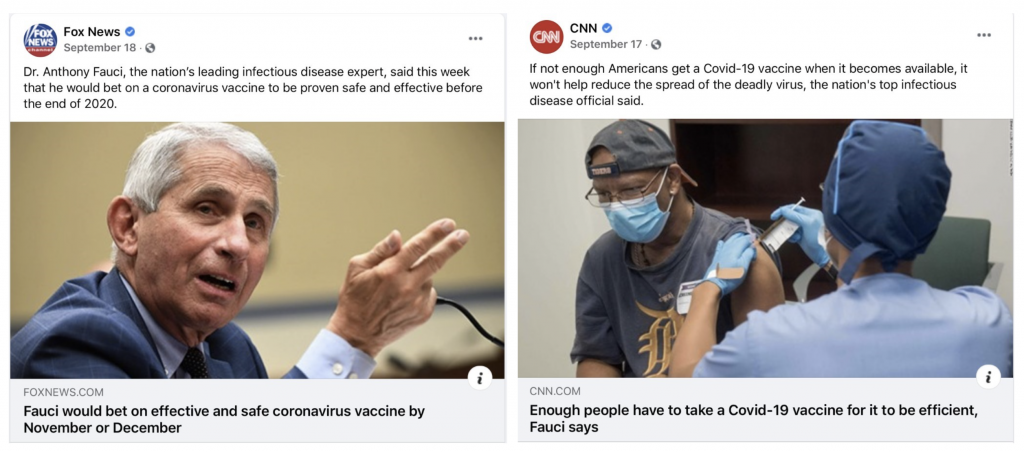
Non-partisan subject matter experts are viewed with a partisan lens.
• Anthony Fauci has been a central figure to the U.S. coronavirus response and is widely regarded as the nation’s top infectious disease expert. He is frequently cited by media and referred to with similar titles by right- and left-leaning outlets. But a person’s news consumption may impact whether or not they trust him.
• CNN and MSNBC viewers are also significantly more likely to trust Fauci to say whether or not a coronavirus vaccine is safe and effective.
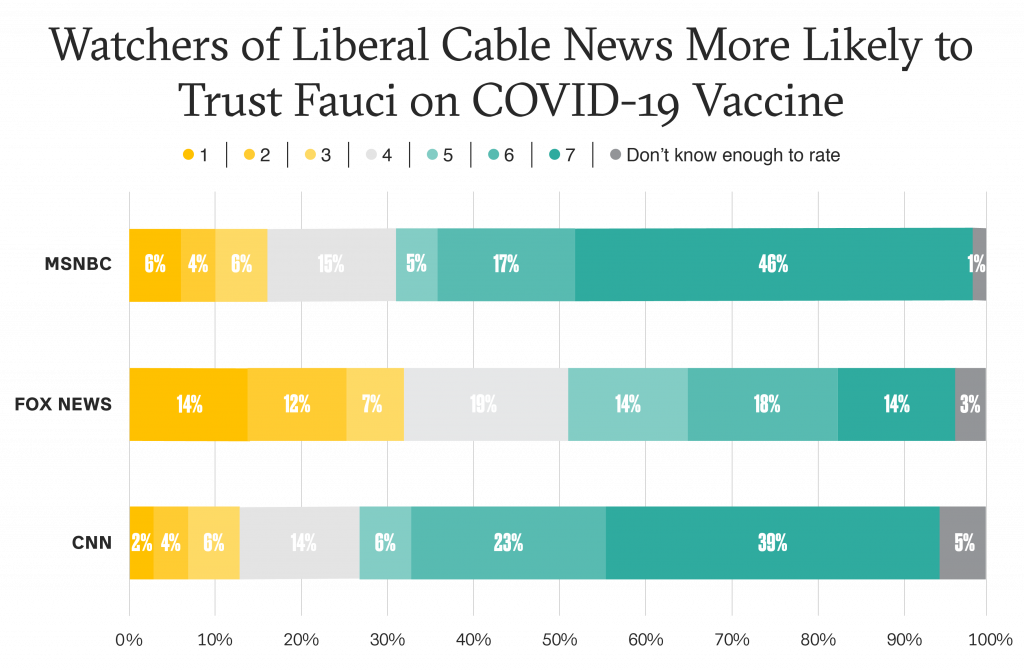
*How much do you trust the endorsement of the safety and effectiveness of a coronavirus vaccine from each of the following? SOURCE: Purple Pulse Survey of US Informed Public. N=847. September 30 – October 2.
• An analysis of comments on Facebook posts which mention Fauci and a coronavirus vaccine further demonstrate that commenters have different reactions to him. Fox News commenters are more likely to express a negative view of Fauci than CNN commenters. 618 comments (38%) on Fox’s post from September 18 are highly critical of the infectious disease expert writing things like, “he flip flops more than anyone I’ve seen,” “This man can’t be trusted,” “I wouldn’t believe a word this man says,” “I would bet he’s got a lot of stock in the company that makes it too” and “This guy tells false information he’s a liar a disgrace he’s working for democrats needs to be put in jail.” This sentiment is expressed in just 32 comments (4%) on CNN’s Facebook post.
In order to combat these varying factors driving coronavirus vaccine hesitancy, it’s important for entities in this space to meet audiences where they are.
This can be accomplished by:
• Developing a deep understanding of key audiences. In order to best engage the audiences that matter to your brand and move them to where you want them to be, it is crucial to understand not only who they are, but what they believe.
• Creating audience-specific messaging, not “one size fits all.” How you tell your story matters. Create custom messages for audiences based on their starting places in order to ensure your message resonates.
• Using a variety of surrogates to tell your story. Different voices appeal to different people. Find a variety of voices who can amplify your message and resonate with the audiences that matter to you.
By Nicki Zink | nicki.zink@purplestrategies.com
Purple is actively partnering with companies and industries to navigate the ever-changing COVID-19 pandemic and prepare for the future that will come after, bringing deep experience helping the world’s best-known companies navigate the world’s toughest challenges. Please reach out to author Nicki Zink or any member of our Purple team to let us know how we can support you.

 What does corporate leadership look like in a divided nation?
What does corporate leadership look like in a divided nation?  Waiting to Engage in D.C. Is the Most Expensive Mistake You’...
Waiting to Engage in D.C. Is the Most Expensive Mistake You’...  The Era of High-Stakes Uncertainty
The Era of High-Stakes Uncertainty  What Forces are Shaping the Future for CMOs?
What Forces are Shaping the Future for CMOs?